|
|
|
Sort Order |
|
|
|
Items / Page
|
|
|
|
|
|
|
| Srl | Item |
| 1 |
ID:
139351
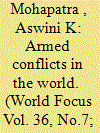

|
|
|
|
|
| Summary/Abstract |
To sum up, what accounts for the rising incidence of internal armed conflicts in plural societies is the interplay of variety of factors ranging from the nature of the polity (i.e. liberal/transitional democratic or autocratic), stage of economic development, level of integration and state-society engagement to the process of state formation and national identity construction.
|
|
|
|
|
|
|
|
|
|
|
|
|
|
|
|
| 2 |
ID:
162306
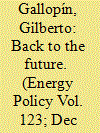

|
|
|
|
|
| Summary/Abstract |
The world system is at an uncertain branch point from which a wide range of possible, qualitatively different, futures could unfold before the end of the Century. Two decades ago, the Global Scenario Group (GSG) published three archetypical sets of scenarios of the future of the planet. These are revisited in the light of the changes and developments that happened since then, plus the emerging new trends, looking for meaningful early warning signals and potential strategic causal nodes that could help steering towards a sustainable global future.
|
|
|
|
|
|
|
|
|
|
|
|
|
|
|
|
| 3 |
ID:
067029
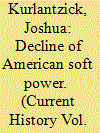

|
|
|
| 4 |
ID:
139960
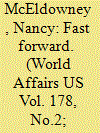

|
|
|
|
|
| Summary/Abstract |
When scanning the international scene today, it is tempting to see shadows of a dark past. Feudal powers annexing neighboring territories, maniacal cults perpetrating atrocities, pandemics threatening to wipe out entire societies—many of today’s top challenges have an eerie resemblance to upheavals of the medieval period. While there is indeed some validity to these parallels, they represent only a partial view of the extraordinarily complex realities unfolding in front of us. We face daunting challenges, to be sure, but we also face unprecedented opportunities for progress, as global poverty levels recede, access to education and medical care expand with the ranks of an international middle class, and technological advances put almost unlimited knowledge and influence into the hands of millions of individuals. Charting a way forward in the midst of this complexity—blunting threats to our security at home, seizing opportunities to advance our interests around the world, and working where possible to alleviate human suffering—is the task of American diplomacy. And if the world of tomorrow looks anything like what the trends of today suggest, effective diplomacy, and effective diplomats, will be more crucial to our national success than ever before.
|
|
|
|
|
|
|
|
|
|
|
|
|
|
|
|
| 5 |
ID:
181197
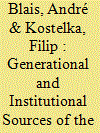

|
|
|
|
|
| Summary/Abstract |
Why has voter turnout declined in democracies all over the world? This article draws on findings from microlevel studies and theorizes two explanations: generational change and a rise in the number of elective institutions. The empirical section tests these hypotheses along with other explanations proposed in the literature—shifts in party/candidate competition, voting-age reform, weakening group mobilization, income inequality, and economic globalization. The authors conduct two analyses. The first analysis employs an original data set covering all post-1945 democratic national elections. The second studies individual-level data from the Comparative Study of Electoral Systems and British, Canadian, and US national election studies. The results strongly support the generational change and elective institutions hypotheses, which account for most of the decline in voter turnout. These findings have important implications for a better understanding of the current transformations of representative democracy and the challenges it faces.
|
|
|
|
|
|
|
|
|
|
|
|
|
|
|
|
| 6 |
ID:
148714
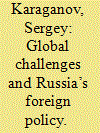

|
|
|
|
|
| Summary/Abstract |
The article discusses the results of Russian foreign policy since the collapse of the Soviet Union against the background of major new global and regional international trends and the policy of other major world powers. The author argues that Russia should work for preventing a new structured confrontation in Europe, maintaining international stability, and keeping the world from sliding into a big war which seems to be more likely now than ever before in the last 50 years. At the same time it should join forces with China, India, Iran and other major non-Western players in building a community of cooperation, development and security for Greater Eurasia, open to the world and serving as one of the pillars of its stable and peaceful development. The world is changing incredibly fast and precariously. Russia must occupy a leading place in this world by moving towards economic growth and playing a key role in preventing a new world war, supporting global strategic stability and building or rebuilding international cooperation and security structures for the decade to come.
|
|
|
|
|
|
|
|
|
|
|
|
|
|
|
|
| 7 |
ID:
073098
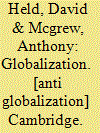

|
|
|
|
|
| Publication |
Cambridge, Polity Press, 2002.
|
| Description |
x, 158p.
|
|
|
|
|
|
|
|
|
|
|
|
Copies: C:1/I:0,R:0,Q:0
Circulation
| Accession# | Call# | Current Location | Status | Policy | Location |
| 046306 | 341.2/HEL 046306 | Main | On Shelf | General | |
|
|
|
|
| 8 |
ID:
137793
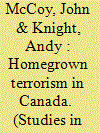

|
|
|
|
|
| Summary/Abstract |
The article examines how global trends related to militant Islamism have influenced patterns of homegrown terrorism in Canada. It seeks to understand how an evolving movement has shaped three case studies, two cases of homegrown terrorism, the case of Momin Khawaja, the “Toronto 18” plot, and the emerging trend of extremist travelers. Recognizing the notable gap in the literature, a growing number of cases of homegrown terrorism and extremism in Canada suggest that further study is required. The article asks why Canadians choose to participate in this movement and why militant Islamist movements are actively recruiting them.
|
|
|
|
|
|
|
|
|
|
|
|
|
|
|
|
| 9 |
ID:
154350
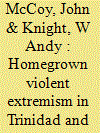

|
|
|
|
|
| Summary/Abstract |
The article examines the subject of homegrown violent extremism related to militant Islamism in the dual-Island Caribbean state of Trinidad and Tobago (T & T). It employs original research drawn from a series of semi-structured interviews and focus groups conducted between November 2015 and January 2016. Tracing the evolution of endogenous forms of radicalism and extremism the article considers how globalized-exogenous forms of militant Islamism associated with Al Qaeda and its offshoots, such as the so-called Islamic State, have impacted local patterns of violent extremism. The case study draws attention to a state and a region that have received scant attention in terrorism studies. As demonstrated by the article, this oversight is imprudent. There are a number of noteworthy findings from this case study for terrorism studies scholars: the unique historical legacy of radicalism, extremism and insurrection among T & T's Islamists; the country's markedly high levels of extremist travelers on a per capita basis and the high rate of religious converts among those travelers; the inter-linkages between criminality and political violence; and the potential threat posed by Trinidadian and Tobagonian militancy regionally.
|
|
|
|
|
|
|
|
|
|
|
|
|
|
|
|
| 10 |
ID:
154978
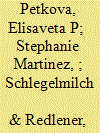

|
|
|
|
|
| Summary/Abstract |
This study characterizes trends in the frequency and characteristics of terrorist attacks in child-serving educational institutions around the world, examining the specific vulnerabilies of children and schools with regard to terrorist violence, as well as the various impacts that violence has on children, communities, and societies. Following the analysis of available data on terrorist attacks against educational institutions, vulnerabilities, and impacts, the study concludes with a discussion of what still needs to be understood in the intersection of child vulnerability and terrorism, and provides recommendations for improving resilience to terrorist attacks against child-serving educational institutions.
|
|
|
|
|
|
|
|
|
|
|
|
|
|
|
|
| 11 |
ID:
104256
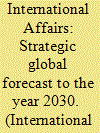

|
|
|
|
|
| Publication |
2011.
|
| Summary/Abstract |
THE EXTREMELY COMPLICATED TASK of long-term forecasting calls for the systemic analysis of global trends to make concrete assessments and recommendations. It would be expedient to use such forecasting to elaborate a strategy for developing and consolidating the national security of Russia to raise the quality of life of its citizens by strengthening its international positions and impact on world processes.
Specialists at the Institute of World Economy and International Relations (IMEMO) have gained extensive experience and developed methodologies in forecasting, allowing them to make qualitative descriptions of strategically important long-term trends. In so doing, they also take international forecasting practices into account.
|
|
|
|
|
|
|
|
|
|
|
|
|
|
|
|
| 12 |
ID:
122201


|
|
|
|
|
|
|
|